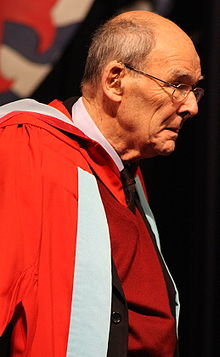
Back ديفيد أرمسترونغ Arabic David Malet Armstrong Catalan دەیڤید ئارمسترانگ CKB David Malet Armstrong German David Malet Armstrong Spanish دیوید مالت آرمسترانگ Persian David Malet Armstrong Finnish David M. Armstrong French David Malet Armstrong Italian 데이비드 말렛 암스트롱 Korean
David Malet Armstrong | |
|---|---|
 Armstrong receiving his doctorate of letters (h.c.) at Nottingham University, UK on 13 December 2007 | |
| Born | 8 July 1926 Melbourne, Australia |
| Died | 13 May 2014 (aged 87) Sydney, Australia |
| Alma mater | University of Sydney |
| Era | 20th-century philosophy |
| Region | Western philosophy |
| School | Analytic philosophy Australian realism Immanent realism[1] Factualism Perdurantism (four-dimensionalism)[2] |
| Academic advisors | John Anderson |
Main interests | Metaphysics, philosophy of mind |
Notable ideas | Instantiation principle Quidditism[3] Maximalist version of truthmaker theory |
Preview warning: Page using Template:Infobox philosopher with unknown parameter "influences"
David Malet Armstrong AO FAHA (8 July 1926 – 13 May 2014),[4] often D. M. Armstrong, was an Australian philosopher. He is well known for his work on metaphysics and the philosophy of mind, and for his defence of a factualist ontology, a functionalist theory of the mind, an externalist epistemology, and a necessitarian conception of the laws of nature.[5]
Keith Campbell said that Armstrong's contributions to metaphysics and epistemology "helped to shape philosophy's agenda and terms of debate", and that Armstrong's work "always concerned to elaborate and defend a philosophy which is ontically economical, synoptic, and compatibly continuous with established results in the natural sciences".[6]
- ^ David Armstrong, Universals: An Opinionated Introduction (1989), p. 8.
- ^ Brian Garrett (2011). What Is This Thing Called Metaphysics?. Taylor & Francis. pp. 54–55. ISBN 978-1-136-79269-4.
- ^ Haecceitism (Stanford Encyclopedia of Philosophy)
- ^ "Professor David Armstrong - obituary". The Telegraph. 9 July 2014. ISSN 0307-1235. Retrieved 10 May 2020.
- ^ Brown, S.; Collinson, D.; Wilkinson, R., eds. (1996). Biographical Dictionary of Twentieth-Century Philosophers. pp. 31–32. ISBN 978-0-415-06043-1.
- ^ Jaegwon Kim; Ernest Sosa; Gary S. Rosenkrantz, eds. (2009). A Companion to Metaphysics (2nd ed.). Wiley-Blackwell. pp. 126–127.